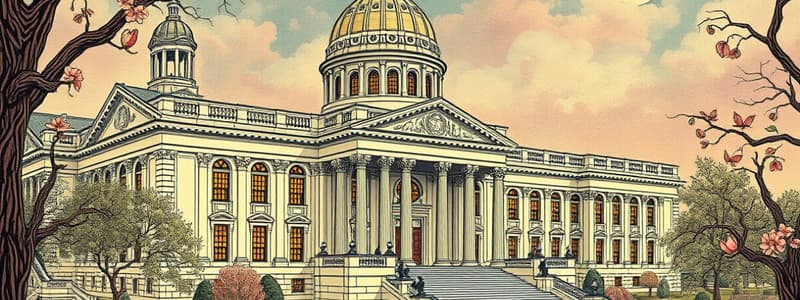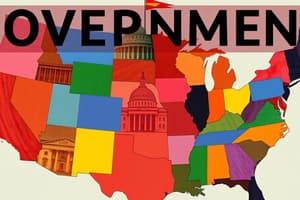Podcast
Questions and Answers
What do constituents refer to?
What do constituents refer to?
- A legislative act finding a person guilty without a trial
- Money set aside by a legislature for a specific purpose
- The distribution of representatives among the states
- The people a member of Congress represents (correct)
What does apportionment mean?
What does apportionment mean?
- A tax levied on goods or services
- A writ ordering a prisoner to be brought before a judge
- Distribution of representatives among the states based on population (correct)
- A formal accusation of misconduct in office
What is an appropriation?
What is an appropriation?
Money set aside for a specific purpose.
What is impeachment?
What is impeachment?
What is oversight in the context of Congress?
What is oversight in the context of Congress?
What is the necessary and proper clause?
What is the necessary and proper clause?
What is an indirect tax?
What is an indirect tax?
What is a direct tax?
What is a direct tax?
What is a deficit in government finance?
What is a deficit in government finance?
What is the commerce clause?
What is the commerce clause?
What is a subpoena?
What is a subpoena?
What does a writ of habeas corpus do?
What does a writ of habeas corpus do?
What is a bill of attainder?
What is a bill of attainder?
What is an ex post facto law?
What is an ex post facto law?
What does reapportionment mean?
What does reapportionment mean?
What is gerrymandering?
What is gerrymandering?
Who is the Speaker of the House?
Who is the Speaker of the House?
What are bills?
What are bills?
What is a floor leader?
What is a floor leader?
What do whips do in Congress?
What do whips do in Congress?
What is a party caucus?
What is a party caucus?
What is a standing committee?
What is a standing committee?
What is a select committee?
What is a select committee?
What is a joint committee?
What is a joint committee?
What is the President of the Senate?
What is the President of the Senate?
What is the president pro tempore?
What is the president pro tempore?
Who is the senate majority leader?
Who is the senate majority leader?
What is the seniority rule?
What is the seniority rule?
What is a filibuster?
What is a filibuster?
What is cloture?
What is cloture?
What is a rider in legislative terms?
What is a rider in legislative terms?
What is a joint resolution?
What is a joint resolution?
What is a concurrent resolution?
What is a concurrent resolution?
What is a discharge petition?
What is a discharge petition?
What is a committee of the Whole?
What is a committee of the Whole?
What is a quorum?
What is a quorum?
What is a roll call vote?
What is a roll call vote?
What is a conference committee?
What is a conference committee?
What is a pocket veto?
What is a pocket veto?
What is a veto?
What is a veto?
Flashcards are hidden until you start studying
Study Notes
Key Terms and Definitions
- Constituents: Individuals represented by a member of Congress, crucial for democratic representation.
- Apportionment: Distribution of congressional representatives based on state population, essential for equitable representation.
- Appropriation: Specific funds allocated by the legislature for designated purposes, important for budget management.
- Impeachment: Formal process of accusing public officials of misconduct, significant for maintaining checks and balances in government.
- Oversight: Congressional review of agency activities, essential for accountability and transparency in government operations.
Constitutional Provisions
- Necessary and Proper Clause: Grants Congress implied powers related to its expressed powers, allowing flexibility in legislation.
- Commerce Clause: Empowers Congress to regulate interstate business activities, foundational for economic governance.
Taxation Types
- Indirect Tax: Tax assessed on goods or services, influencing consumer behavior indirectly.
- Direct Tax: Tax levied directly on individuals or organizations, impacting personal financial assessments.
Fiscal Concepts
- Deficit: Occurs when federal spending exceeds revenues, indicating potential financial instability.
- Reapportionment: Renegotiation of representation after each census, vital for reflecting demographic changes in Congress.
Legislative Processes
- Gerrymandering: Manipulation of district boundaries for political gain, often undermining fair representation.
- Bill of Attainder: Legislative act declaring an individual guilty without trial, prohibited as a violation of due process.
- Ex Post Facto Law: Law criminalizing actions retroactively, which is unconstitutional due to fairness principles.
Legislative Leadership
- Speaker of the House: Presiding officer of the House of Representatives and leader of the majority party, playing a crucial role in legislative agenda.
- Floor Leader: Party strategist responsible for legislative organization and coalition building.
- Whips: Party leaders who ensure party discipline and manage vote counts on key legislation.
Committees and Resolutions
- Standing Committee: Permanent committee focusing on specific policy areas, integral for detailed legislative scrutiny.
- Select Committee: Temporary committee for specific purposes, addressing unique issues in-depth.
- Joint Committee: Comprises members from both houses to streamline investigation and reporting processes.
Voting and Debate Procedures
- Filibuster: Tactical delay method, allowing prolonged debate to obstruct legislation, reflecting the importance of minority rights.
- Cloture: Procedure to end filibuster and limit debate, facilitating legislative progress.
- Roll Call Vote: Method of voting where members declare their votes openly, enhancing accountability.
Additional Legislative Tools
- Rider: An unrelated amendment to secure a bill's passage, often controversial in legislative debates.
- Discharge Petition: Tool enabling a majority of the House to bring a stalled bill to the floor, enhancing legislative efficiency.
- Quorum: Minimum number of members required for legislative business, ensuring representation.
Final Legislative Actions
- Pocket Veto: President's option to ignore a bill, effectively killing it if Congress adjourns.
- Veto: Formal rejection of legislation by the president, which can be overturned by a two-thirds majority in Congress, showcasing executive power limits.
Resolution Types
- Joint Resolution: A resolution with binding effect once signed by the president, often used for significant legislative decisions.
- Concurrent Resolution: Expresses opinions of both houses without legal force, reflecting consensus on specific issues.
Studying That Suits You
Use AI to generate personalized quizzes and flashcards to suit your learning preferences.




